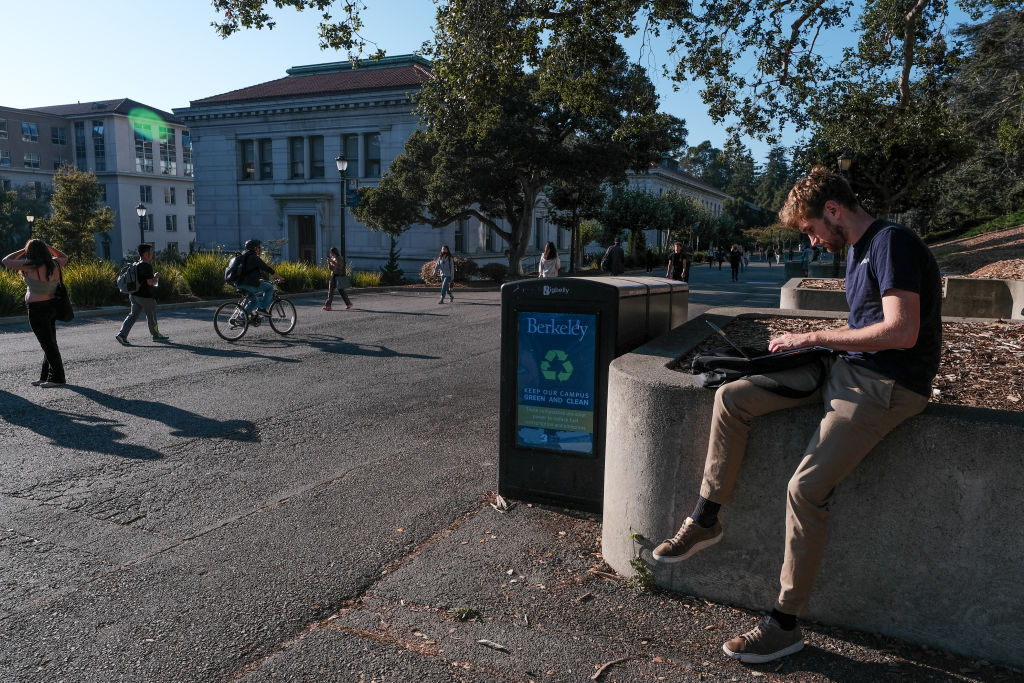Cybersecurity professionals are in such high demand that they can land six-figure salaries after graduation and advance to roles that pay nearly $1 million. And the field is rapidly expanding: The number of unfilled cybersecurity jobs grew 350% between 2013 and 2021, according to Cybersecurity Ventures, which covers the global cyber economy. While it’s not mandatory to have a bachelor’s, master’s, or Ph.D. degree to work in cybersecurity, it can certainly help—and there’s a way to obtain a degree for free—thanks to the federal government.
Through the CyberCorps: Scholarship for Service Program, the federal government pays for a person’s education in exchange for committing to work for the federal government or a state, local, tribal, or territorial government in cybersecurity—so long as it’s an equal length of time as their schooling took.
“You will get all tuition paid without [us] asking how much it is,” says Victor Piotrowski, CyberCorps’ lead program director at the National Science Foundation (NSF). “There is no limit. We pay all tuition, all fees. Then we provide you with a cash stipend.”
Additionally, the program offers living stipends of $25,000 per year for undergraduate students and $34,000 for graduate students. Participants can also receive $6,000 for professional development. If that sounds enticing, read on to learn how the CyberCorps program works.
What is the CyberCorps program?
Founded in the waning days of the Bill Clinton administration by presidential directive, CyberCorps was created to address the growing need for cybersecurity professionals working in the federal government. And as the world has become increasingly digital, cybersecurity demands have only expanded. One-third of federal cybersecurity roles are currently unfilled, according to Piotrowski.
CyberCorps is a partnership between the NSF, the Department of Personnel Management and the Department of Homeland Security. Each year, colleges and universities across the country apply to take part in the program. Out of the dozens of schools that apply each year, only about eight to 10 are awarded between $3 million and $5 million to establish a five-to-six-year program. Presently, roughly 900 students are active in the program at 94 participating universities.
How do I apply for the CyberCorps scholarship program?
Instead of applying to the NSF, students who wish to take part in the program apply at one of the 94 schools that currently has a CyberCorps grant. To be a part of the program, students sign a legal agreement with the federal government to exchange their schooling for work after graduating.
Once enrolled in the program, students maintain a current resume in CyberCorps’ databases. Hiring managers at different governmental agencies have access to those resumes for recruiting purposes. “Students, when they are still in school, create connections with the agencies to have internships, then when they graduate, they choose,” Piotrowski says. “They can go anywhere they want.”
What happens after I graduate from the CyberCorps program?
While a student who graduates from the CyberCorps program has an obligation to repay the government with service, Piotrowski says it doesn’t have to start right away.
“When a student graduates, [they] have 18 months to start working on their obligation. They don’t have to start the day after graduation,” he says. “The bottom line is your commitment is not for life. Your commitment is for maximum three years.”
After the conclusion of their paid government service, CyberCorps grads can opt to stay at their current organization or move on to another job.
Still, there are a small handful of graduates who change their minds about working for the federal government. Those individuals must pay back the government for their schooling, which averages $55,000 per year for undergrad. Students who don’t complete their program must also pay back money.
Piotrowski says that even if graduates wish to work for Google or another company, it makes sense for them to fulfill their government commitment first, stating that they will make more money in the long run and gain government connections and contracts. The only downside of working in cybersecurity for the government, Piotrowski says, is employees must undergo background checks and he stresses the importance of being honest in answering the government’s questions.
“We have students that tried every possible drug in high school, and we still enrolled them, because the important thing is that [the drug use is] in the past,” Piotrowski says.
Many CyberCorps grads end up working at the National Security Agency; 740 CyberCorps grads have worked for the NSA, by Piotrowski’s count.
“As we’re recruiting at those universities, we are … looking for those CyberCorps students that owe back a commitment of service to the United States government,” says Dave Luber, deputy director of cybersecurity for NSA, adding that he sometimes sits in on Ph.D. dissertations of students in the program. “It’s a good opportunity to track their progress throughout their university work before they join the NSA.”
Even for those graduates who don’t want to work for the NSA, there are a wide variety of options open to them. In a report to Congress last year, CyberCorps listed more than 700 types of positions within the federal government that related to cybersecurity.
“Cybersecurity is one of the most dynamic interesting professions,” Piotrowski says, noting the millions of open jobs and that only two of three cybersecurity positions at the federal level are currently filled. “That [ratio] will not get better in your lifetime.”
See how the schools you’re considering fared in Fortune’s rankings of the best master’s degree programs in data science (in-person and online), nursing, computer science, cybersecurity, psychology, public health, and business analytics, as well as the doctorate in education programs and MBA programs (part-time, executive, full-time, and online).








